The Jefferson-Madison Debates: Reopening the American Mind
September 12th, 2018 // 8:15 am @ Oliver DeMille
Challenges for the Millennial Generation (and Z)
“Miss Amelia prayed as if the Lord were ten million miles away,
and she would be surprised to pieces
if she got anything she wanted.”
—Gene Stratton-Porter, Laddie
THE PROBLEM?
 Millennials. Or, as they are frequently called by critics, the “Snowflake Generation”. Considered by some the weakest generation in the last hundred years, and criticized, fairly or not, as “the Me Me Me generation…lazy, entitled narcissists who still live with their parents”[1] until age 30 or beyond. Born after 1984, the oldest of them are 30-34, the youngest (born 9/11), sometimes called Generation Z) are still 9-17. Today’s older teens and “twenty-somethings” make up the bulk of this group. The typical introduction to Millennials and Z goes something like this:
Millennials. Or, as they are frequently called by critics, the “Snowflake Generation”. Considered by some the weakest generation in the last hundred years, and criticized, fairly or not, as “the Me Me Me generation…lazy, entitled narcissists who still live with their parents”[1] until age 30 or beyond. Born after 1984, the oldest of them are 30-34, the youngest (born 9/11), sometimes called Generation Z) are still 9-17. Today’s older teens and “twenty-somethings” make up the bulk of this group. The typical introduction to Millennials and Z goes something like this:
“Millennials got so many participation trophies growing up that…40% believe they should be promoted every two years, regardless of performance.”[2]
Large numbers of them are “technology addicted” and struggle at “keeping a job or a relationship”.[3]
On university campuses, the Millennial/Z’s have headlined numerous trends hailed by critics as spreading emotional weakness. For example, though college was once applauded as a place for young people to challenge themselves intellectually and emotionally by learning a diversity of ideas, the opposite is now true. In a report aptly titled “The Coddling of the American Mind”, The Atlantic noted that in “the name of emotional well-being, college students are increasingly demanding protection from words and ideas they don’t like, and seeking punishment of those who give even accidental offense…. [It is] disastrous for education—and likely to worsen mental health on campus.”[4] Learning opposite views, and how to combat them, is increasingly absent in many classrooms and departments.
 This has gone so far that some students at Harvard Law School recently called for professors “not to teach rape law…lest it cause students distress.”[5] Even discussing or pointing out the wrong side of bad things is in many cases becoming taboo.[6] The article questioned: “What are we doing to our students if we encourage them to develop extra-thin skin just before they leave the cocoon of adult protection?”[7] Answer: training them to seek a similar cocoon even as adults, typically from the government. This is the opposite of what Thomas Jefferson believed universities should be. As the founder of the University of Virginia, he wrote:
This has gone so far that some students at Harvard Law School recently called for professors “not to teach rape law…lest it cause students distress.”[5] Even discussing or pointing out the wrong side of bad things is in many cases becoming taboo.[6] The article questioned: “What are we doing to our students if we encourage them to develop extra-thin skin just before they leave the cocoon of adult protection?”[7] Answer: training them to seek a similar cocoon even as adults, typically from the government. This is the opposite of what Thomas Jefferson believed universities should be. As the founder of the University of Virginia, he wrote:
“This institution will be based on the illimitable freedom of the human mind. For here we are not afraid to follow truth wherever it may lead, nor to tolerate any error so long as reason is left free to combat it.”[8]
The Atlantic closed this article with the following words:
“We believe that this is still—and will always be—the best attitude for American universities.”[9]
Today, in contrast, words that are considered offensive are banned from many campuses, as are many ideas or speakers who differ from the politically correct norm. Such schools, and many of their Millennial/Z students do, in fact, appear “afraid to follow the truth wherever it may lead”, or even to listen.
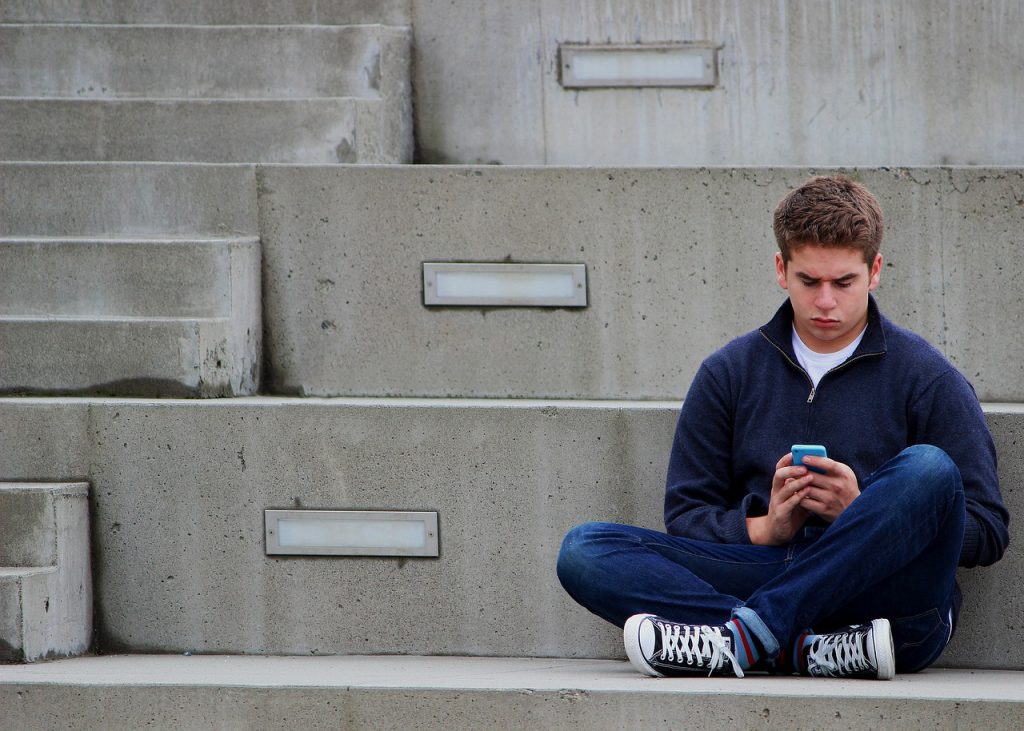 Surprisingly, the military is dealing with many of the same issues. On the one hand, as James Fallows wrote in The Atlantic in January 2015: “Americans admire the military as they do no other institution. Through the past two decades, respect for the courts, the schools, the press, Congress, organized religions, Big Business, and virtually every other institution in modern life has plummeted. The one exception is the military…. In a Gallup poll last summer, three-quarters of the public expressed ‘a great deal’ or ‘quite a lot’ of confidence in the military. About one-third had comparable confidence in the medical system, and only 7 percent in Congress.”[10] In 2018 American confidence in the military is still at 74%.[11] (Confidence in newspapers is 23%, public schools 29%, banks 30%, courts 22%, TV news 20%, organized religion 38%, small business 67%, big business 25%.[12])
Surprisingly, the military is dealing with many of the same issues. On the one hand, as James Fallows wrote in The Atlantic in January 2015: “Americans admire the military as they do no other institution. Through the past two decades, respect for the courts, the schools, the press, Congress, organized religions, Big Business, and virtually every other institution in modern life has plummeted. The one exception is the military…. In a Gallup poll last summer, three-quarters of the public expressed ‘a great deal’ or ‘quite a lot’ of confidence in the military. About one-third had comparable confidence in the medical system, and only 7 percent in Congress.”[10] In 2018 American confidence in the military is still at 74%.[11] (Confidence in newspapers is 23%, public schools 29%, banks 30%, courts 22%, TV news 20%, organized religion 38%, small business 67%, big business 25%.[12])
On the other hand, a negative term now used in some circles to describe America is “Chickenhawk Nation”, because many Americans are willing for the United States “to go to war, as long as someone else is going.”[13] While three-fourths of Americans admire the military, less than a quarter support their children joining any of the armed services.[14] Moreover, a majority of parents actively discourage or oppose military service by their own children.
Beyond this, only 29% of Millennials now meet the eligibility requirements for military service, causing shortfalls in recruiting needs.[15] And in recent years, “the number of eligible enlistees has been smaller and smaller.”[16] This is largely a matter of physical readiness—or in this case, it’s lack.[17] The snowflake trend has had a significant impact on the fitness levels of American youth.
 On the political front, in the post Bernie Sanders era, many Millennial/Z’s support government-mandated free college, free housing, a monthly wage for everyone whether or not they have a job, and the appeal of “socialism.” Many even like the word or label of “socialism”, with over half of Millennials self-identifying as “socialist”.[18] But, ironically, they have little appetite for the “struggle of the working class to create a socialist society.” [19] That’s too much work. And they certainly aren’t looking for “the long revolution” to bring about socialism.[20] They just want socialist programs handed to them by big government, without the struggle, sacrifice, or effort.[21] Many Millennial/Z’s seem to feel they “deserve” such programs, without doing anything to earn them.[22]
On the political front, in the post Bernie Sanders era, many Millennial/Z’s support government-mandated free college, free housing, a monthly wage for everyone whether or not they have a job, and the appeal of “socialism.” Many even like the word or label of “socialism”, with over half of Millennials self-identifying as “socialist”.[18] But, ironically, they have little appetite for the “struggle of the working class to create a socialist society.” [19] That’s too much work. And they certainly aren’t looking for “the long revolution” to bring about socialism.[20] They just want socialist programs handed to them by big government, without the struggle, sacrifice, or effort.[21] Many Millennial/Z’s seem to feel they “deserve” such programs, without doing anything to earn them.[22]
Such young people are, in short, on a path toward something far removed from traditional American values or freedoms. They will become the biggest block of eligible voters in the 2018 midterm elections,[23] though most of them didn’t actually vote in 2016 and probably won’t until 2020 or beyond.
Is this generation exhibiting the characteristics we want for America’s future? After all, the word “generation” comes from “gene”, or “genes”. What we choose becomes who we are, and influences what we pass on to posterity.
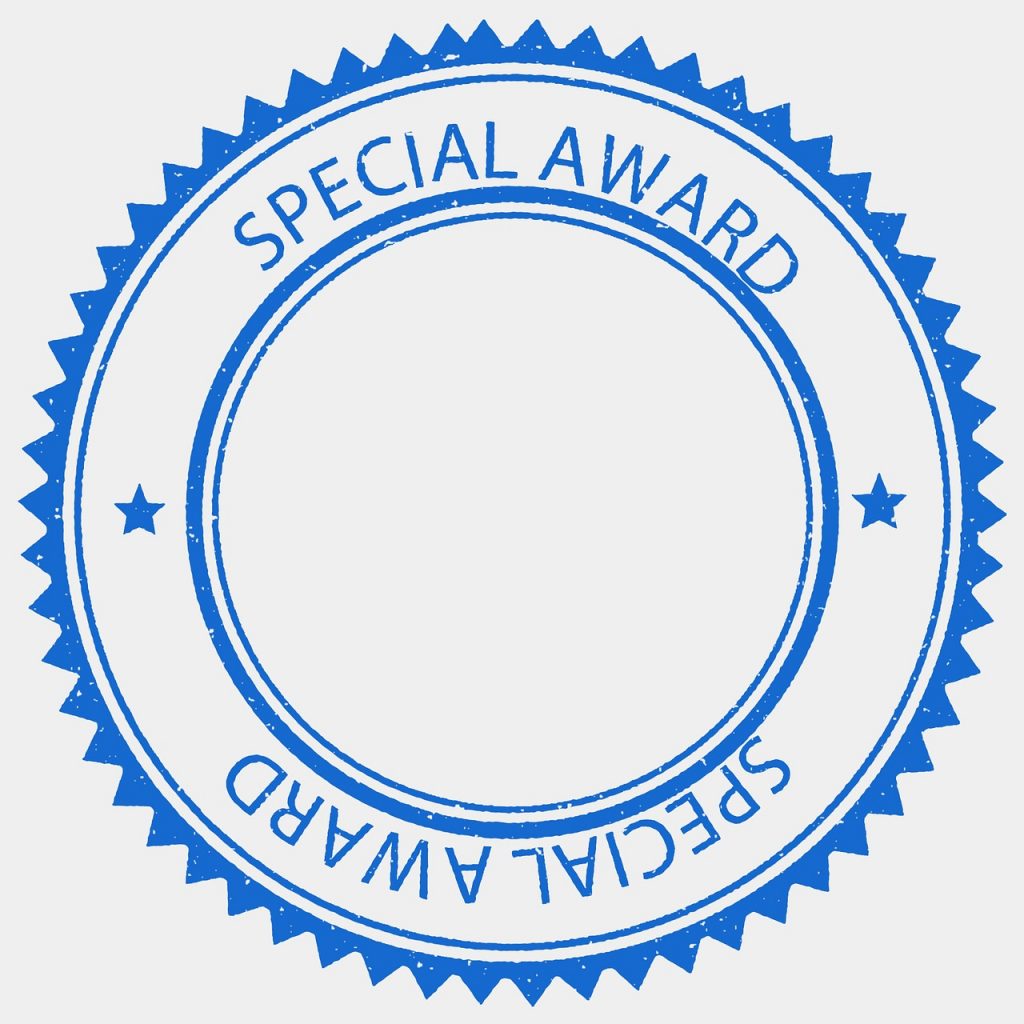 A more immediate question: Why are many Millennial/Z’s this way? Many analysts blame it mostly on helicopter parenting—a generation over-programmed, over-protected, promised success without sacrifice or hard work by doting parents who sheltered their children from hard things. As one report from England put it: “Millennials are struggling at work because their parents ‘gave them medals for coming last’”.[24] Of course, there are exceptions to these patterns in the Millennial/Z generation, but the trend is still sobering. A lot of Millennial/Z’s do expect college, promotions, income, work and relationships to be easy, and when they aren’t, they expect the government to intervene and somehow make things easy for them. This will certainly impact our politics and policies—and soon.
A more immediate question: Why are many Millennial/Z’s this way? Many analysts blame it mostly on helicopter parenting—a generation over-programmed, over-protected, promised success without sacrifice or hard work by doting parents who sheltered their children from hard things. As one report from England put it: “Millennials are struggling at work because their parents ‘gave them medals for coming last’”.[24] Of course, there are exceptions to these patterns in the Millennial/Z generation, but the trend is still sobering. A lot of Millennial/Z’s do expect college, promotions, income, work and relationships to be easy, and when they aren’t, they expect the government to intervene and somehow make things easy for them. This will certainly impact our politics and policies—and soon.
SOLUTIONS
“The government and its chiefs do not have
the powers of the mythical Santa Claus.”
—Ludwig von Mises
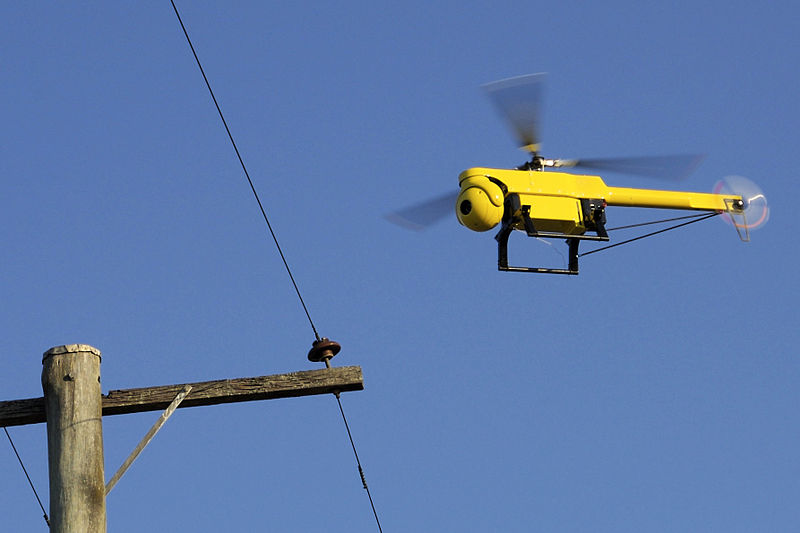 Despite the Tiger-Mom vs. Cool Mom debates,[25] many parents of Millennial/Z’s “have now realised [British spelling] that their well-intentioned parenting strategies have backfired.”[26] As a result, a number of people are trying to fix what many consider the “helicopter-parent/snowflake/wimpy-generation” debacle.
Despite the Tiger-Mom vs. Cool Mom debates,[25] many parents of Millennial/Z’s “have now realised [British spelling] that their well-intentioned parenting strategies have backfired.”[26] As a result, a number of people are trying to fix what many consider the “helicopter-parent/snowflake/wimpy-generation” debacle.
For example, in 2016 Parents.com listed the number one trend in parenting as “Saying bye-bye to helicoptering…just being more laid back when it comes to managing kids’ lives and schedules.”[27] In another trend, Free Range Parenting has recently popularized the “concept of raising children in the spirit of encouraging them independently and with [less] parental supervision”, including more “realistic personal risks.”[28]
Another example: A youth-initiated movement came from teens Alex and Brett Harris in their book Do Hard Things, which called upon youth to expect more from themselves and move past the limiting beliefs of helicopter parents. The subtitle of this book says it all: A Teenage Rebellion Against Low Expectations. In our day and age, and any other time in world history for that matter, a true “rebellion against low expectations” can only be accomplished by doing hard things, including a lot of hard work.
They wrote: “Most people don’t expect you to understand what we’re going to tell you in this book. And even if you understand, they don’t expect you to care. And even if you care, they don’t expect you to do anything about it. And even if you do something about it, they don’t expect it to last. We do.” This bestseller helped a number of Millennials embrace the idea of “doing hard things”, even in the face of a society that too often militates against teens or parents who seek—or even allow—anything difficult. Author Connor Boyack shows young people and their parents how to embrace this at an even higher level in his excellent book Passion-Driven Education.
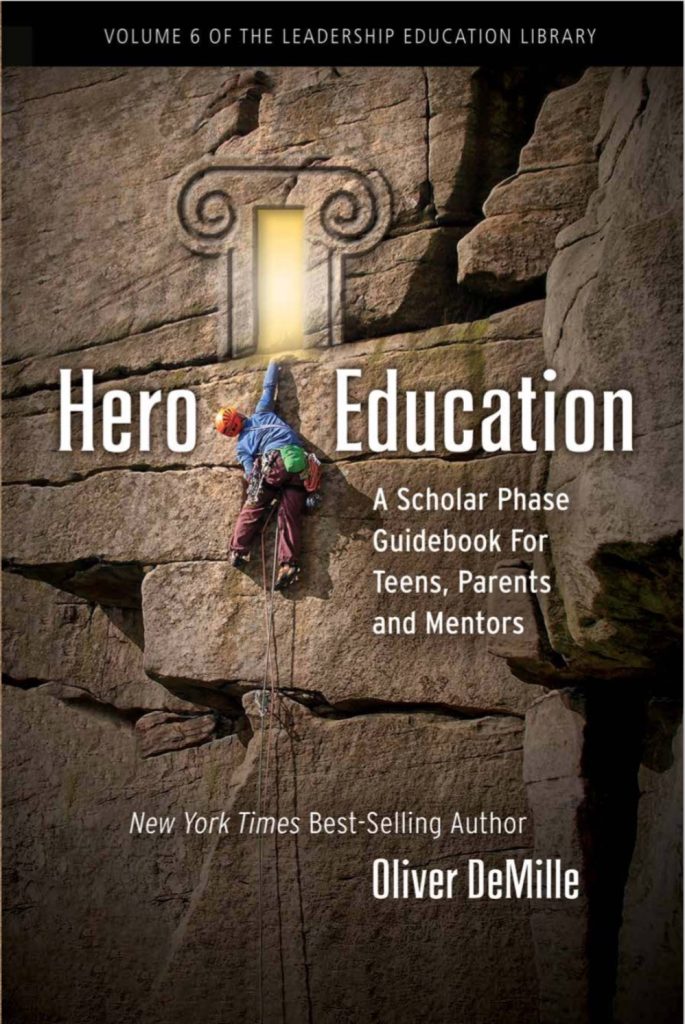 Despite some real progress for a few families and youth in this arena, for far too many of today’s young people the generational tide continues in the direction of easy or easier, adult-sanctioned snowflake weakness, trophies for everyone, and a culture of “blame your parents” (or your teachers, or anyone but yourself), “embrace feelings of unearned entitlement”, “turn to the government to fix anything you don’t like”, and “never take the hard path of extreme work, sacrifice, risk, and great achievement”. More and more parents are realizing the problem—the disaster, really—with this approach, and looking for an antidote.
Despite some real progress for a few families and youth in this arena, for far too many of today’s young people the generational tide continues in the direction of easy or easier, adult-sanctioned snowflake weakness, trophies for everyone, and a culture of “blame your parents” (or your teachers, or anyone but yourself), “embrace feelings of unearned entitlement”, “turn to the government to fix anything you don’t like”, and “never take the hard path of extreme work, sacrifice, risk, and great achievement”. More and more parents are realizing the problem—the disaster, really—with this approach, and looking for an antidote.
We have personally witnessed this generational struggle as we have promoted the principles of great education in our Thomas Jefferson Education (TJEd) system. Our call for Scholar Phase, an intense teen study program of voluntarily putting in massive effort and work to earn a truly great education, is often considered unrealistic by the old guard. But it has been revolutionary and incredibly successful for those (Millennial/Z’s and parents) who have risen to the challenge.
We have seen firsthand that many teens can do very, very hard things.[29] Moreover, once they get a taste for it, they frequently fall in love with the challenge.[30] This inspired me to write the book Hero Education, which builds on the theme of young people accomplishing great things by voluntary action, personal initiative, and hard work. Also, in our experience with TJEd, the best results frequently come where parents and mentors not only encourage great effort, but also lead the way—showing their teens what to do by personal example.
PART II
A RADICAL (AND SURPRISING) SUGGESTION!
“Did you ever wish with all your might that something would happen, and wait for it, expect it, and long for it, and nothing did, until it grew so bad, it seemed as if you had to go on another minute you couldn’t bear it?” —Gene Stratton-Porter, Laddie
 I recently read a report that encouraged even more success of this type. It was both intriguing and fascinating. It may be the best thing I’ve read specifically on the challenges of Millennials and Gen Z (and helicopter vs. leadership parenting) since Allan Bloom’s The Closing of the American Mind. It is found in Outside magazine, and entitled: “Rewilding the American Child.”
I recently read a report that encouraged even more success of this type. It was both intriguing and fascinating. It may be the best thing I’ve read specifically on the challenges of Millennials and Gen Z (and helicopter vs. leadership parenting) since Allan Bloom’s The Closing of the American Mind. It is found in Outside magazine, and entitled: “Rewilding the American Child.”
That’s right:
re – wild – ing
Emphasis on “wild”.
I’m so intrigued by this concept that whenever I think of it I feel this word needs a good ! ! ! to punctuate it effectively. And note that the word “rewilding” is an active verb, like learning, reading, discussing, or loving.
Or jumping, running, hiking, swimming, etc.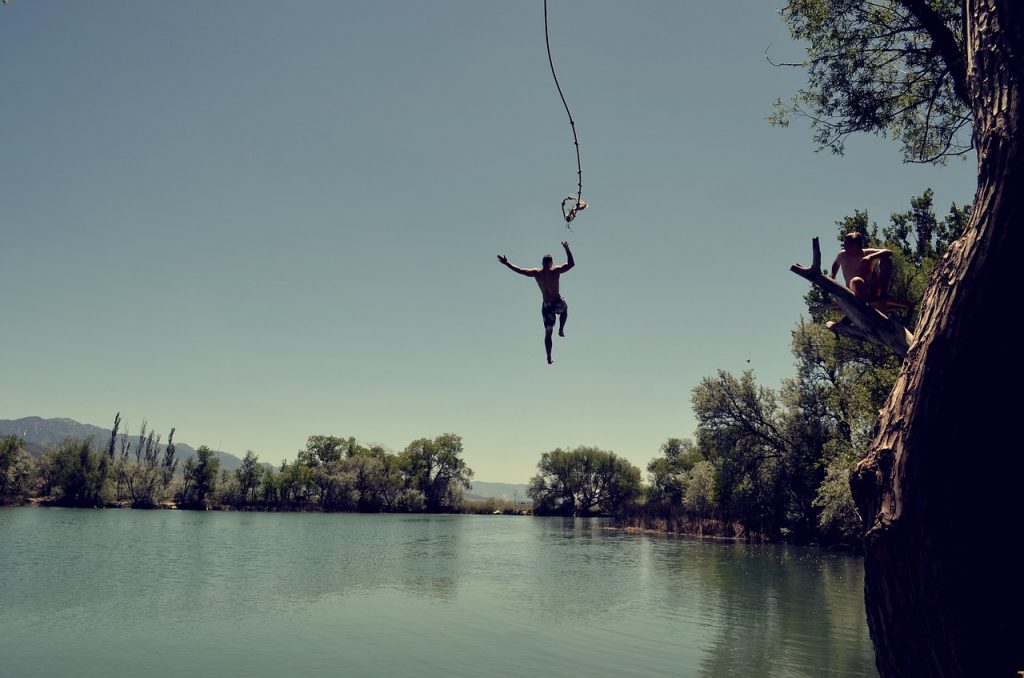
Profound.
The report begins:
“Overscheduled.
“Addicted to screens.
“It’s time to set our kids free.”[31]
Freedom. What a great idea. Especially applied to education.
Indeed, the recommendations go a step past free-range childhood—all the way to the wilds. Literally.
From the report:
 “Our children are in crisis…. creating a generation of entitled wimps…. Today, America’s kids are caught up in one of the largest mass migrations in human history: the movement indoors.”[32]
“Our children are in crisis…. creating a generation of entitled wimps…. Today, America’s kids are caught up in one of the largest mass migrations in human history: the movement indoors.”[32]
This is a momentous statement. Take a moment to re-read the last quote and let it sink in. This is big. Here’s more:
“Only recently have we begun to spend our lives penned in by walls, staring at screens.”[33]
Indeed, we’re living through a major development in human history. The full ramifications of this alteration from all past history are yet unknown, but it is already clear that the rise of institutionally-designed “wimpy-ness” is both real and, unless something changes, “the new normal.”
 The impact on society is drastic. This shift has coincided with a rise in the average age of young people becoming independent—with increased dependence in where they live, their finances, and their emotional development. In a reversal of progress, 30 is now the new 18. Adulthood is increasingly put off until later. Marriage, having children, accepting increased career responsibility—all are procrastinated by the bulk of Millennials. And Z’s are following suit.
The impact on society is drastic. This shift has coincided with a rise in the average age of young people becoming independent—with increased dependence in where they live, their finances, and their emotional development. In a reversal of progress, 30 is now the new 18. Adulthood is increasingly put off until later. Marriage, having children, accepting increased career responsibility—all are procrastinated by the bulk of Millennials. And Z’s are following suit.
The “Rewilding” report recommends things that will seem extreme to some, reckless to others, but get right to the core of what many consider the problem of the so-called “Wimpy Generation”.[34] These suggestions include:
“It’s time to make childhood an adventure again. Kids deserve the chance to explore nature without an agenda or a chaperone, to take risks and learn to get themselves out of trouble, to fall in love with nature…”[35]
I’m reminded of something penned by Lord Byron:
“There is pleasure in the pathless woods, there is rapture in the lonely shore, there is society where none intrudes, by the deep sea, and the music in its roar. I love not man the less, but Nature more.”[36]
A generation that seldom spends real time in the real out-of-doors is deprived of so much, too often oblivious to large swaths of learning and therefore to key parts of life, self, and purpose. Another important quote, this one from Henry James, further illustrates the challenge:
Summer afternoon–summer afternoon;
to me these have always been the two most beautiful words
in the English language.[37]
But if we’re caught in the Trapped-Indoors rut, summer differs very little from any other season. Screens are all that matter. Trees, waves, leaves, clouds, rain, even books in many cases, are foreign. Alien even.
What kind of education, or life, is this?
“Look deep into nature,” Albert Einstein is credited with saying, “and then you will understand everything better.”[38]
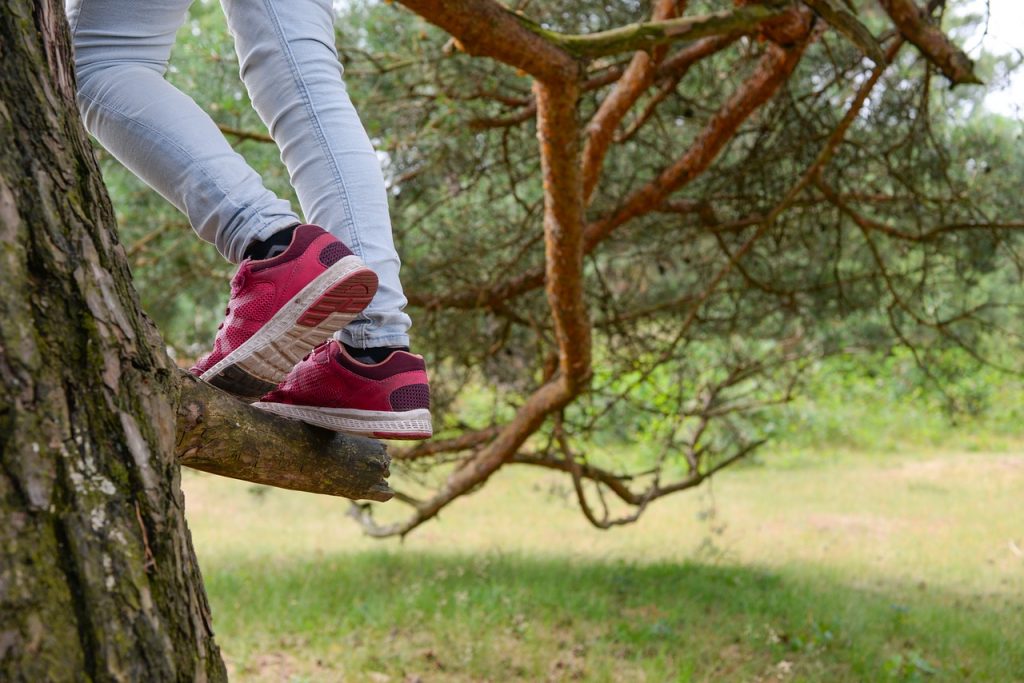 Years ago I took a group of college students on a field trip many hours from home. We stayed one night at a beautiful old estate, and when we first arrived we walked through the house and around the grounds. Almost immediately, as we moved into the large fields at the back of the home, one student noticed a huge old tree and gleefully ran to it and climbed up the branches far above the ground. Several other students followed her, and they sat together in their leafy perch and talked for hours about the books we were covering in class at the time, the connections of these books to life, and other important ideas.
Years ago I took a group of college students on a field trip many hours from home. We stayed one night at a beautiful old estate, and when we first arrived we walked through the house and around the grounds. Almost immediately, as we moved into the large fields at the back of the home, one student noticed a huge old tree and gleefully ran to it and climbed up the branches far above the ground. Several other students followed her, and they sat together in their leafy perch and talked for hours about the books we were covering in class at the time, the connections of these books to life, and other important ideas.
I recently returned to the same estate, and pointed out the great tree to a couple of my own children. They marveled at it, as did I. As they climbed, I found myself surprised that more than a decade earlier I had never even considered the safety of those climbing the tree. The world has changed much during the ensuing years, and in the current environment I quickly realized that an extreme focus on safety would have been one of my first concerns if that event had happened today. To the point that I’m sure I would have told the students to climb down immediately.
That would have been tragic. Yet in our sadly “unwilded” and “newly indoor” world, things have changed, and not for the good. “The undiscovered country”, Shakespeare told us, “from whose bourn No traveller returns.” He was speaking, of course, of death. But could the same thinking be applied to the Generation of Screens—once in their grip, No Traveller really returns? Are we now prisoners of the walls and silicon processors that so dominantly define our age and control so many of today’s values?
Perhaps this goes too far, but does our concern about the loss of nature for so many young people extend far enough? Are we even aware of the problem?
One of the best things about the “Rewilding” report is that is doesn’t fall into the almost universal modern educational trap of recommending a solution for the kids only—while the parents stay inside with their thumbs addictively swiping screens. The parents are in fact counseled that to really see a change in their youth they’ll need to lead the way, by showing “them that we, too, love to play outside.”[39] If we added the words “work” and “read” to this sentence, it would be almost ideal. Plato and Aristotle would agree, I think. Thomas Jefferson, whose two favorite pastimes were walking in the wilds and reading, would certainly approve.
 The report recommends a number of options for “rewilding” our kids, including:
The report recommends a number of options for “rewilding” our kids, including:
- “Explore together”
- “Establish Boundaries”
- “Work the Farm”
- “Take back roads…”
- “Fuel their love of games…”
- “…go rafting, take backcountry ski trips, and spend long days hiking…”
- “Age-Appropriate Adventure”
- “A Deep Connection With Animals”
- “Make Sports Fun Again”
The report in Outside magazine, the September 2018 issue, elaborates on all of these and includes many more suggestions; I highly recommend it. The report notes that it is of course important to establish effective safety and other guidelines and rules in all of this, and to make good choices. (Such a disclaimer is probably NECESSARY if Boomers and Gen Xers are reading. But it increasingly appears that risk is the major ingredient missing in the lives of what so many consider the Wimpy Generation.)
In short, with wise planning and implementation, each young person’s education can be greatly improved through outdoor activities…
 HARD STOP. Here is what one Millennial/Z teen told me when I read this article with him (this exact article, the one you’re reading now). He interrupted me at this point, after the disclaimer in the paragraph above, and said: “Fine. But it is just as important, maybe more important, to help them be strong. Far too often, parents equate ‘safe’ with ‘good’, and the result is just weakness. Many kids are held back by frightened, overprotective parents. Our modern society is so skewed to the side of coddling us that strength is usually missing.”
HARD STOP. Here is what one Millennial/Z teen told me when I read this article with him (this exact article, the one you’re reading now). He interrupted me at this point, after the disclaimer in the paragraph above, and said: “Fine. But it is just as important, maybe more important, to help them be strong. Far too often, parents equate ‘safe’ with ‘good’, and the result is just weakness. Many kids are held back by frightened, overprotective parents. Our modern society is so skewed to the side of coddling us that strength is usually missing.”
When I tried to point out the need for balance in this, he interrupted again: “In truth,” he said, “strength is ultimately the only safety. Adults know this. But they act like their kids will never need to be strong.”
I tried to reiterate my point about balance, and he shook his head. “Listen to me. At some point, the kid will have to walk out into the real world. Period.” Then, after a pause, “Prepare them now. That’s what we need from parents.”[40]
THE LONELY
“‘Difficulty’ is the name of an ancient tool
that was created purely to help us define who we are.”
—Paulo Coelho
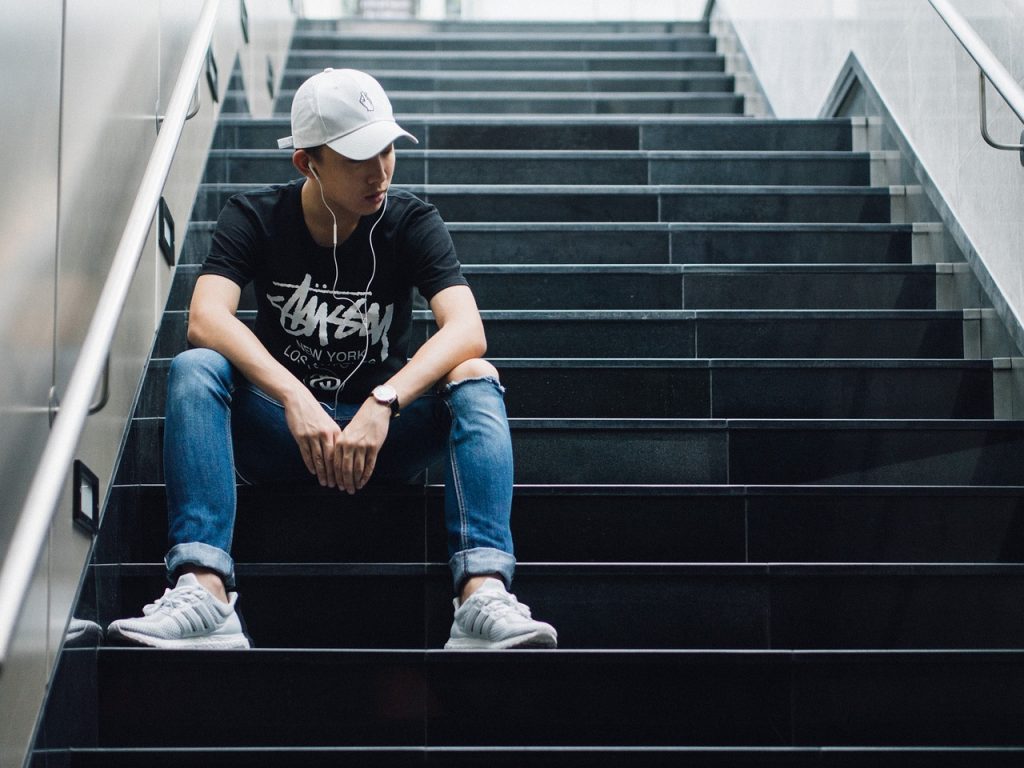 The “Rewilding” report also points out another truly profound reality:
The “Rewilding” report also points out another truly profound reality:
“Today’s kids are lonelier than any previous generation.”[41]
This rings all too true to anyone who works a lot with youth. Modernity has taken its toll. The constant connection with screens, and indoor physical separation from other people, too often gets in the way of other more important connections—with parents, siblings, pets, nature, mentors, hobbies, work toward great goals and passions, books, talents and interests, challenging problems and overcoming them, the kind of lessons that are learned only from struggle, etc. These are seldom the skills learned on screens.
A funny joke circulating on the Internet reads something like this:
The Wi-Fi in my house went down for a few minutes
I had to spend time with my family.
They seem like good people…
But is this really funny? In Millennial/Z humor, the several youth I’ve asked assure me, it’s hilarious. For the rest of us, it’s pretty dark. (When one of my Millennial daughters read this, she said the whole joke was actually terrible. Why? Because she was horrified that the Wi-Fi went out at all. “That’s infuriating!” she exclaimed. Another daughter’s big concern was why the person didn’t have data on their phone so they could stay on the Internet even without Wi-Fi. What is she talking about????)
 Humor aside, today’s epidemic of so many teens and twenty-somethings (and even some in their thirties) who put off adult responsibility and remain weakly dependent on authority figures for…well, almost everything…may well be a natural result of the migration indoors.[42] The “snowflake” view of so many on college campuses is indicative of this trend. What is needed in today’s world—our homes, our communities, our learning environments—is a major injection of grit.[43] Of initiative, stamina, guts, and tenacity. And these things are nearly always learned away from screens.
Humor aside, today’s epidemic of so many teens and twenty-somethings (and even some in their thirties) who put off adult responsibility and remain weakly dependent on authority figures for…well, almost everything…may well be a natural result of the migration indoors.[42] The “snowflake” view of so many on college campuses is indicative of this trend. What is needed in today’s world—our homes, our communities, our learning environments—is a major injection of grit.[43] Of initiative, stamina, guts, and tenacity. And these things are nearly always learned away from screens.
In short, technology is a wonderful and powerful tool; few would dispute this. But it is not the only wonderful and powerful tool. A list of tools that are even more wonderful and more powerful include those just outlined above: parents, siblings, pets, nature, mentors, hobbies, work toward great goals and passions, books, talents and interests, challenging problems and overcoming them, the kind of lessons that are learned only from struggle, etc.
The great challenge—and fix—for Millennial/Z’s is to find and implement the right combination of ALL these tools. To be honest, this is true for non-Millennials as well. Put simply, it’s time to re-open the American mind. And get outside…a lot.
Note that doing this is going to be hard. Which is exactly what we need.
“…what you learn there doesn’t amount to a hill of beans compared to what you can find out yourself outdoors. Schoolhouses are made wrong. If they must be, they should be built in a woods pasture beside a stream, where you could wade, swim, and be comfortable in summer, and slide and skate in winter. The windows should be cut to the floor, and stand wide open, so birds and butterflies could pass through. You ought to learn your geography by climbing a hill, walking through a valley, wading creeks, making islands in them, and promontories, capes, and peninsulas along the banks. You should do your arithmetic sitting under trees…”
—Gene Stratton-Porter, Laddie
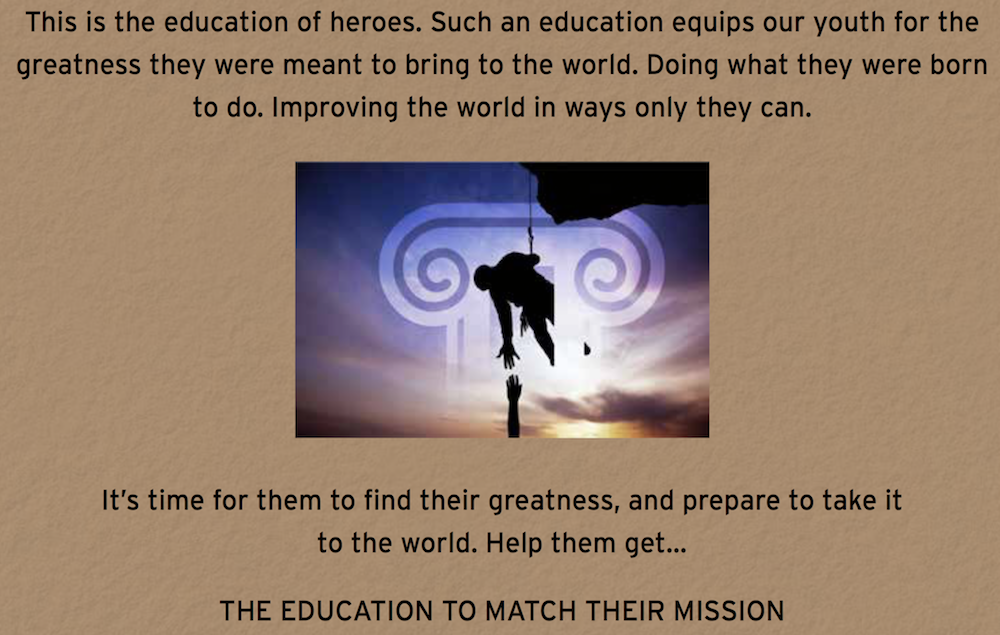
(For more on this topic, especially real solutions, see Hero Education by Oliver DeMille)
(For a Funny Video Click Here>>)
[1] Time, Joel Stein, May 9, 2013
[4] The Atlantic, Greg Lukianoff and Jonathan Haidt, September 2015
[10] The Atlantic, James Fallows, January/February 2015, citing Gallup
[13] The Atlantic, James Fallows, January/February 2015
[14] See The New York Times, Damien Cave, June 3, 2005.
[15] Military1.com, March 6, 2018
[18] American Institute for Economic Research, Max Gulker, December 2017, “Over Half of Millennials Identify as Socialist: Here’s How to Change Their Minds”
[19] See, for example: The New York Times, Michelle Goldberg, June 30, 2018, “The Millennial Socialists Are Coming”; The American Interest, Ben Judah, “What Is Millennial Socialism?”; chicagotribune.com, Heather Wilhelm, July 9, 2018, “Why are millennials so hot for socialism?”
[20] Ibid.
[21] Ibid.
[22] Ibid.
[23] See Politifact, Andy Sherman, February 13, 2018
[24] Independent.co.uk, Rachel Hosie, February 7, 2017
[25] See for example Battle Hymn of the Tiger Mother, by Amy Chua, Bringing Up Bėbė, by Pamela Druckerman, and “Are ‘Tiger Moms’ Better than Cools Moms?” (The Atlantic) by Julia Ryan, among others.
[26] Independent.co.uk, Rachel Hosie, February 7, 2017
[27] Parents.com, Melissa Willets, “6 Parenting Trends to Look Forward to in 2016”
[28] Wikipedia.org, “Free-range parenting”
[29] See Hero Education, Oliver DeMille
[31] Outside, multiple authors, September 2018
[36] Cited in Forest Therapy, 2018, by Sarah Ivens
[39] Outside, multiple authors, September 2018
[40] Ephraim DeMille (age 18 – son of my brother, William), August 2018
[41] Outside, multiple authors, September 2018
[43] See the following: Angela Duckworth, Grit; Claude Hamilton, Thick-Skinned; Claude Hamilton, Toughen Up.
Category : Blog &Citizenship &Community &Culture &Current Events &Economics &Education &Entrepreneurship &Family &Generations &History &Information Age &Leadership &Liberty &Mission &Producers &Prosperity











